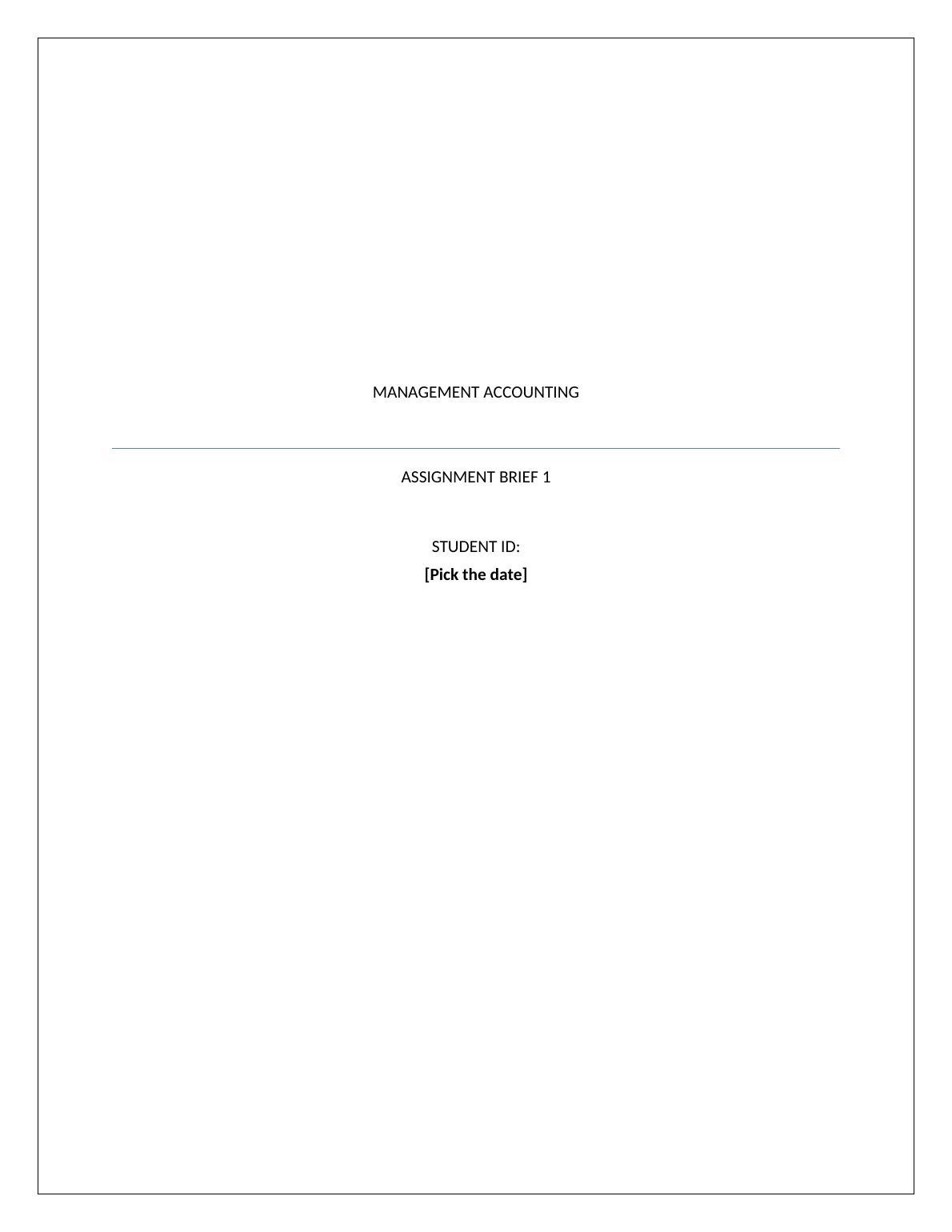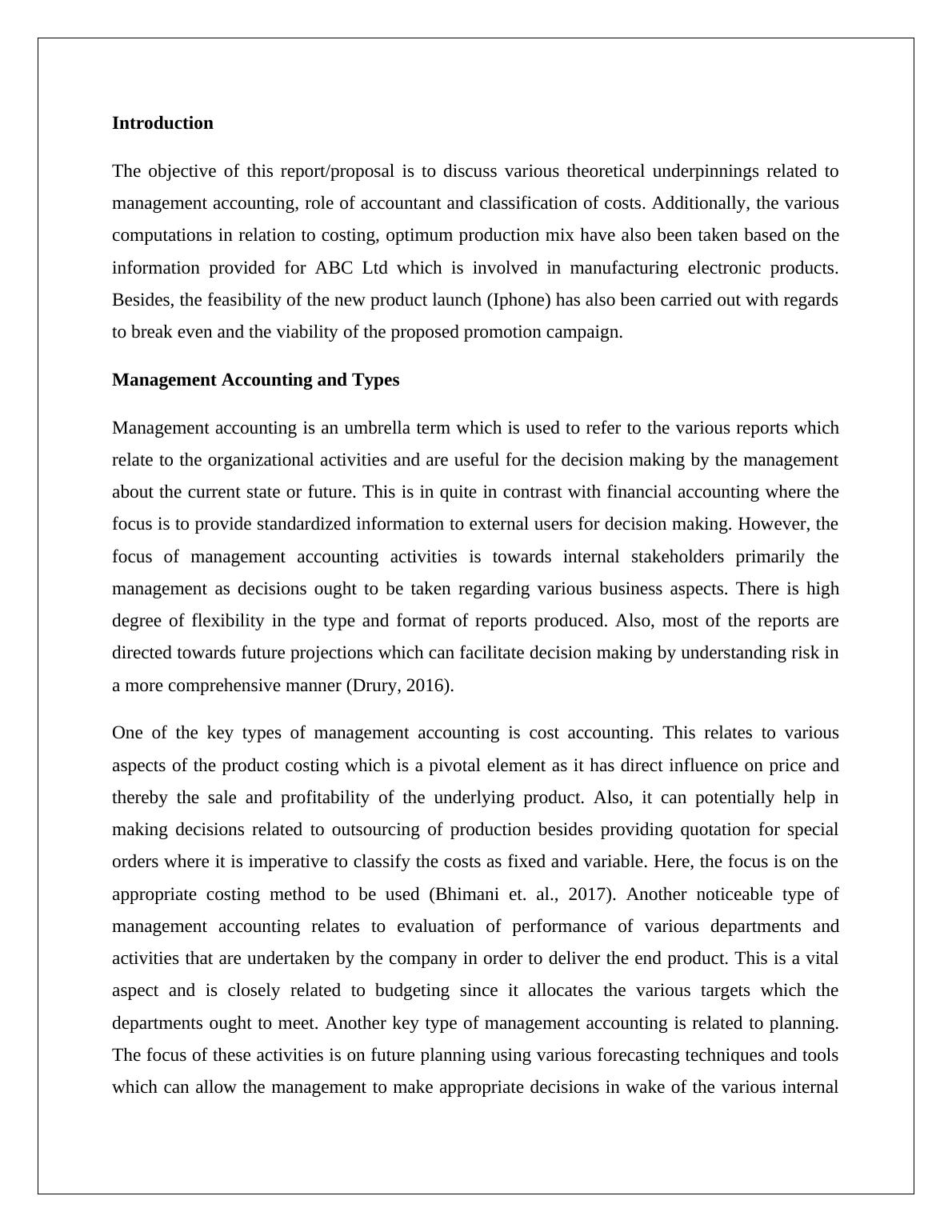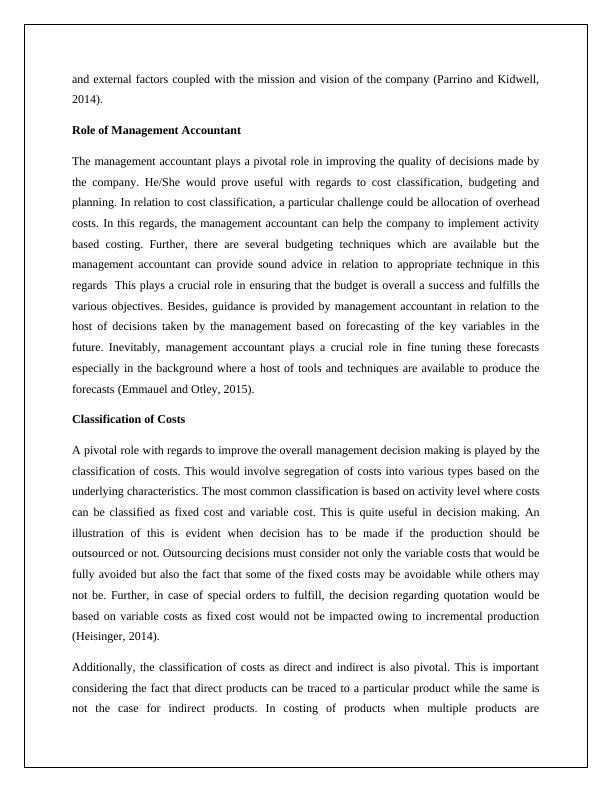Management Accounting: Theoretical Underpinnings, Role of Accountant, and Cost Classification
Added on 2023-01-20
8 Pages2323 Words61 Views
MANAGEMENT
ACCOUNTING
ASSIGNMENT BRIEF 1
STUDENT ID:
[Pick the date]
ACCOUNTING
ASSIGNMENT BRIEF 1
STUDENT ID:
[Pick the date]

Introduction
The objective of this report/proposal is to discuss various theoretical underpinnings related to
management accounting, role of accountant and classification of costs. Additionally, the various
computations in relation to costing, optimum production mix have also been taken based on the
information provided for ABC Ltd which is involved in manufacturing electronic products.
Besides, the feasibility of the new product launch (Iphone) has also been carried out with regards
to break even and the viability of the proposed promotion campaign.
Management Accounting and Types
Management accounting is an umbrella term which is used to refer to the various reports which
relate to the organizational activities and are useful for the decision making by the management
about the current state or future. This is in quite in contrast with financial accounting where the
focus is to provide standardized information to external users for decision making. However, the
focus of management accounting activities is towards internal stakeholders primarily the
management as decisions ought to be taken regarding various business aspects. There is high
degree of flexibility in the type and format of reports produced. Also, most of the reports are
directed towards future projections which can facilitate decision making by understanding risk in
a more comprehensive manner (Drury, 2016).
One of the key types of management accounting is cost accounting. This relates to various
aspects of the product costing which is a pivotal element as it has direct influence on price and
thereby the sale and profitability of the underlying product. Also, it can potentially help in
making decisions related to outsourcing of production besides providing quotation for special
orders where it is imperative to classify the costs as fixed and variable. Here, the focus is on the
appropriate costing method to be used (Bhimani et. al., 2017). Another noticeable type of
management accounting relates to evaluation of performance of various departments and
activities that are undertaken by the company in order to deliver the end product. This is a vital
aspect and is closely related to budgeting since it allocates the various targets which the
departments ought to meet. Another key type of management accounting is related to planning.
The focus of these activities is on future planning using various forecasting techniques and tools
which can allow the management to make appropriate decisions in wake of the various internal
The objective of this report/proposal is to discuss various theoretical underpinnings related to
management accounting, role of accountant and classification of costs. Additionally, the various
computations in relation to costing, optimum production mix have also been taken based on the
information provided for ABC Ltd which is involved in manufacturing electronic products.
Besides, the feasibility of the new product launch (Iphone) has also been carried out with regards
to break even and the viability of the proposed promotion campaign.
Management Accounting and Types
Management accounting is an umbrella term which is used to refer to the various reports which
relate to the organizational activities and are useful for the decision making by the management
about the current state or future. This is in quite in contrast with financial accounting where the
focus is to provide standardized information to external users for decision making. However, the
focus of management accounting activities is towards internal stakeholders primarily the
management as decisions ought to be taken regarding various business aspects. There is high
degree of flexibility in the type and format of reports produced. Also, most of the reports are
directed towards future projections which can facilitate decision making by understanding risk in
a more comprehensive manner (Drury, 2016).
One of the key types of management accounting is cost accounting. This relates to various
aspects of the product costing which is a pivotal element as it has direct influence on price and
thereby the sale and profitability of the underlying product. Also, it can potentially help in
making decisions related to outsourcing of production besides providing quotation for special
orders where it is imperative to classify the costs as fixed and variable. Here, the focus is on the
appropriate costing method to be used (Bhimani et. al., 2017). Another noticeable type of
management accounting relates to evaluation of performance of various departments and
activities that are undertaken by the company in order to deliver the end product. This is a vital
aspect and is closely related to budgeting since it allocates the various targets which the
departments ought to meet. Another key type of management accounting is related to planning.
The focus of these activities is on future planning using various forecasting techniques and tools
which can allow the management to make appropriate decisions in wake of the various internal

and external factors coupled with the mission and vision of the company (Parrino and Kidwell,
2014).
Role of Management Accountant
The management accountant plays a pivotal role in improving the quality of decisions made by
the company. He/She would prove useful with regards to cost classification, budgeting and
planning. In relation to cost classification, a particular challenge could be allocation of overhead
costs. In this regards, the management accountant can help the company to implement activity
based costing. Further, there are several budgeting techniques which are available but the
management accountant can provide sound advice in relation to appropriate technique in this
regards This plays a crucial role in ensuring that the budget is overall a success and fulfills the
various objectives. Besides, guidance is provided by management accountant in relation to the
host of decisions taken by the management based on forecasting of the key variables in the
future. Inevitably, management accountant plays a crucial role in fine tuning these forecasts
especially in the background where a host of tools and techniques are available to produce the
forecasts (Emmauel and Otley, 2015).
Classification of Costs
A pivotal role with regards to improve the overall management decision making is played by the
classification of costs. This would involve segregation of costs into various types based on the
underlying characteristics. The most common classification is based on activity level where costs
can be classified as fixed cost and variable cost. This is quite useful in decision making. An
illustration of this is evident when decision has to be made if the production should be
outsourced or not. Outsourcing decisions must consider not only the variable costs that would be
fully avoided but also the fact that some of the fixed costs may be avoidable while others may
not be. Further, in case of special orders to fulfill, the decision regarding quotation would be
based on variable costs as fixed cost would not be impacted owing to incremental production
(Heisinger, 2014).
Additionally, the classification of costs as direct and indirect is also pivotal. This is important
considering the fact that direct products can be traced to a particular product while the same is
not the case for indirect products. In costing of products when multiple products are
2014).
Role of Management Accountant
The management accountant plays a pivotal role in improving the quality of decisions made by
the company. He/She would prove useful with regards to cost classification, budgeting and
planning. In relation to cost classification, a particular challenge could be allocation of overhead
costs. In this regards, the management accountant can help the company to implement activity
based costing. Further, there are several budgeting techniques which are available but the
management accountant can provide sound advice in relation to appropriate technique in this
regards This plays a crucial role in ensuring that the budget is overall a success and fulfills the
various objectives. Besides, guidance is provided by management accountant in relation to the
host of decisions taken by the management based on forecasting of the key variables in the
future. Inevitably, management accountant plays a crucial role in fine tuning these forecasts
especially in the background where a host of tools and techniques are available to produce the
forecasts (Emmauel and Otley, 2015).
Classification of Costs
A pivotal role with regards to improve the overall management decision making is played by the
classification of costs. This would involve segregation of costs into various types based on the
underlying characteristics. The most common classification is based on activity level where costs
can be classified as fixed cost and variable cost. This is quite useful in decision making. An
illustration of this is evident when decision has to be made if the production should be
outsourced or not. Outsourcing decisions must consider not only the variable costs that would be
fully avoided but also the fact that some of the fixed costs may be avoidable while others may
not be. Further, in case of special orders to fulfill, the decision regarding quotation would be
based on variable costs as fixed cost would not be impacted owing to incremental production
(Heisinger, 2014).
Additionally, the classification of costs as direct and indirect is also pivotal. This is important
considering the fact that direct products can be traced to a particular product while the same is
not the case for indirect products. In costing of products when multiple products are

End of preview
Want to access all the pages? Upload your documents or become a member.
Related Documents
Report on Cost Accounting Techniqueslg...
|8
|2568
|33
Management Accounting Assignment (MA)lg...
|20
|5365
|224
Management Accounting Assignment PDFlg...
|23
|5884
|67
Management Accounting - Jeffrey and Sons Ltd.lg...
|20
|4687
|70
Management Accounting and Costing Methodslg...
|8
|1855
|33
Report On Nature & Role Of Management Accountinglg...
|19
|5154
|43
